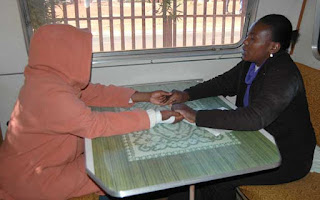Africa can be
a tough place and, although the South African government has made
progress in setting up clinics and primary healthcare facilities in
many rural communities, the simple fact is, sometimes patients are
just too ill to get to one of those facilities.
It is for
this reason that Carryou Ministry operates an extensive home-based
care program.
“Teams of
workers walk from home to home, caring for people who need physical
and emotional support during their illness,” says Mzi Tshikitsha,
Home-based care Programme Manager.
“Part of
the service we also provide is to be with patients during their final
hours.”
“The
Home-Based Care program strives to achieve and maintain a high
standard of palliative care that is both empathetic and offers
dignity to all patients unable to access alternative medical care,”
says Mzi.
“We do
this by carrying out basic but essential tasks like washing and
feeding the patient, moving them to help prevent bed sores and
ensuring he or she takes medication as prescribed.
“In
addition, Care workers also assist the patients' families by feeding
the family, cleaning their houses, washing clothes and collecting
water from community taps.
“The Care
workers are also trained to counsel children and adults, and as such,
can offer emotional and spiritual counseling to patients and their
families. They also ensure children are not exposed to traumatic
situations,” he says.
But, as
always, money needed to do the important work, is in short supply.
“We do our
best to provide food parcels for destitute families and orphans,”
says Mzi.
“Parcels
include maize-based porridge, soup, sugar, salt, oil, beans, peanuts,
matches and washing powder. Fortified nutritional meals are provided
free of charge for individuals infected with HIV and those with
compromised immune systems.
“But, in
truth, without the financial support we get from US-based, Sue
Heywood and her supporters in the USA, we would not be able to supply
many of these essential items.”
Yet, despite
the difficulties, Carryou Ministry's Home-Based Care program still
manages to make life easier for more than 250 people every month.
Their work
has seen some Tuberculosis sufferers and patients on anti-retroviral
drug programmes, recover enough to be able to return to work.
In addition,
door to door awareness campaigns were conducted at 15 informal
settlements where 200 000 male condoms and 16000 female condoms were
distributed in an effort to help prevent the spread of HIV and AIDS.
“We are
starting to see the message get out there,” says Mzi “and now
people are starting to voluntarily disclose their HIV status –
something that did not happen in the past.”
If you would
like to help with this vitally important work please click the “How you can help” link on the right or contact us.



No comments:
Post a Comment